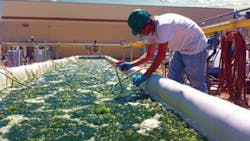Biotech's Company's Vision of Creating an Industry Meets Reality
Heliae, which began as an incubated tech startup on the campus of Arizona State University, was founded on the premise that algae can provide value in a number of markets if the right technology platform is devised to enable commercialization.
“Our big vision is to create the industry,” explains Dan Simon, CEO of Heliae.
That dream has become reality as Heliae last week announced that is has formed a partnership with Triton Health and Nutrition that will lead to bringing algae therapeutics to market in 2014.
From its initial start in 2010 the company has succeed in developing the platform it envisioned. Called Volaris, it uses sunlight and low-cost carbon feedstocks to produce high-value products from algae.
Currently Heliea is in the final stages of construction of its first commercial plant in Gilbert, Ariz., and will begin delivering nutraceutical products to customers later this year.
As the company grew from 20 employees in 2010 to 85 in 2012 and needed more space, it chose Gilbert, Ariz., due to available land, a business-friendly environment and the desire of the community to create a technology cluster. The company forecasts employing more than 140 by 2014.
This initial Heliae-Triton development partnership is focused on the production of Mammary Associated Amyloid (MAA), the first in Triton’s PhycoShield product line. MAA is a protein found in the colostrum of mammals that stimulates production of a mucus coating in the digestive tract. This mucus coating prevents colonization of pathogenic bacteria that would otherwise result in the onset of diarrheal diseases. Triton’s MAA has the potential to reduce diarrheal diseases worldwide, which kill approximately 20% of the world’s livestock each year, as well as account for over two million human deaths each year, and are the leading cause of infant mortality in developing countries. Triton’s MAA is expected to be commercially available in 2014.
Triton’s proprietary MAA algae will be produced using Heliae’s Volaris advanced algae technology platform. As the partnership progresses, Heliae and Triton aim to deploy an extensive pipeline of Triton’s advanced algae strains using Volaris. Triton is capable of producing complex proteins, enzymes, and other biologics in algae suitable for diverse applications across multiple industries. Triton’s pipeline includes antibacterials, anti-diarrheals, vaccines, antioxidants, catalytic enzymes, and growth factors for use in human and animal health, nutrition, and cosmetics.
